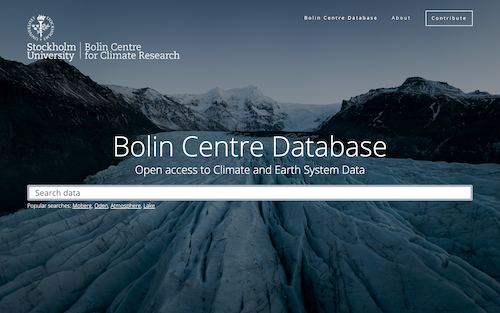Bolin Centre Database
The Bolin Centre Database provides open access of climate and other Earth system data from scientists at the centre and their collaborators. The Bolin Centre Database will help to make your data open, FAIR and visually appealing.
We provide a DOI
Each dataset and source code in the Bolin Centre Database is assigned a unique DOI. This makes it easy to cite and find your data. If a dataset has more than one version, each version will have its own DOI.
We have close contact with you
We have close contact with you and we are familiar with the research done at the Bolin Centre and many of its scientists. We can help you to make sure that your data is richly and clearly described.
git code repository
Sharing source code from research projects is one of the main components in open science. We recommend that you make your code available through the Bolin Centre Code Repository. Your code repository will get a unique DOI.
We can manage large datasets
In general we recomend to reduce the size of datasets larger than 200 GB before publication. However, for datasets that are considered particularly important we can accept substantially larger data volumes. This can for example be large observational datasets or large model results:
- Historical and future global weather forecast data (8.1 TiB, 153,404 files)
- Simulated particle number concentrations over Europe (1.1 TiB, 87 files)
We can create data visualizations
We think it is important that people understand what the data can tell. We are happy to develop interactive visualizations of your data, in collaboration with you, to make your data understandable to a broader audience. Here are some examples:
We can provide data collections for research groups
Data collections can be created to organise several datasets that are related. This can, for example be data generated at research stations, during research expeditions or by research groups. Here are some examples:
We have secure storage with backup in Sweden
We have secure storage located in Sweden, following governmental policies. It is hosted by SUNET and incrementally backed up on a different location.
Control the usage of your data using a license
By setting a license on a dataset you can make it easy for others to understand how the data can be used and how to give credit to the scientists who produced the data.
For data that can be used with free/libre/open software, we recommend the Open Data Commons Attribution License (ODC-By). But you can choose any license that is relevant for your data.
Other data repositories
We recommend you to use the Bolin Centre Database. If you for some reason prefer to publish data somewhere else, we suggest the following alternatives:
More information about data repositories and data publishing is provided by the Stockholm University research data management team, which includes staff at the university library. The team offers curation and support on dedicated repositories on both Zenodo and Figshare.
Archive
If you publish your data at the Bolin Centre Database, your data will in most cases be archived in the e-archive at Stockholm University, according to Swedish law. This e-archive is currently under development.
Status
The Bolin Centre Database currently has:
- 458 datasets with metadata,
- 17 TiB of data,
- 1,267,113 data files.


